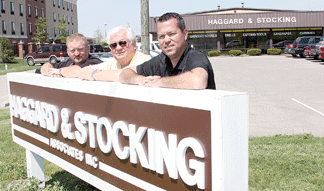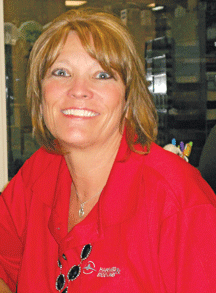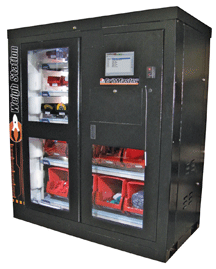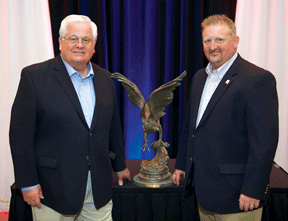Finding FOD
Haggard & Stocking Associates works with CribMaster to help defense contractor manage foreign object debris requirements
By Rich Vurva
 |
|
Jeff Haggard, Herb Haggard and Ron Barnett of Haggard & Stocking Associates, the Indianapolis-based distributor that won the 2013 ISA American Eagle Excellence in Industry Award. |
In most industrial tool vending applications, the primary objective is to closely track items withdrawn from the vending unit. The system’s software notifies a distributor when it’s time to replenish inventory and issues reports that help plant management understand usage patterns of the tools being dispensed on a daily basis.
But there’s another critical objective in the aerospace industry, where it’s equally important to know what’s being returned to the vending unit at the end of each shift. A wayward reamer or countersink left behind in an airplane engine compartment can potentially cause thousands of dollars in damage or even engine failure. Known as foreign object damage (FOD), the National Aerospace FOD Prevention Inc. estimates the cost of FOD to the global aerospace industry at $4 billion annually.
The Federal Aviation Administration (FAA) has established a Foreign Object Debris program to manage any object with the capacity to injure airport or air carrier personnel and damage aircraft, and aerospace manufacturers have established strict FOD guidelines to follow where aircrafts are built or maintained.
Haggard & Stocking Associates is an Indianapolis-based full-line MRO distributor that serves industrial and aerospace markets throughout the United States. In Greenville, Texas, Haggard operates a vendor managed inventory program for a major U.S. Defense contractor. The contractor approached Haggard about establishing an automated VMI system to provide more cost control and FOD compliance at multiple point-of-use locations throughout its massive North Texas facility.
Companies that are lax in their FOD processes risk fines or even losing government contracts, so compliance issues are a major concern, explains David Allen, operations manager for Haggard & Stocking’s aerospace division. “If you’re not in compliance and you can’t get in compliance, you run the risk of losing all of your military contracts,” he says.
The company asked for help from Haggard & Stocking to use industrial vending technology to automate its labor-intensive FOD control process.
 “They have a one-for-one exchange area. If someone comes in to retrieve a drill, at the end of their shift, they have to return that drill,” says Shannon Jackson, Texas regional manager for Haggard & Stocking.
“They have a one-for-one exchange area. If someone comes in to retrieve a drill, at the end of their shift, they have to return that drill,” says Shannon Jackson, Texas regional manager for Haggard & Stocking.
When employees checked out a tool from the tool crib, the crib attendant would hang a chit on a board next to that employee’s name. If an employee checked out five tools, there would be five chits on the board. When all five tools were returned, the employee would retrieve the corresponding chit. Tool crib attendants also made notes of the various tools each employee withdrew. The time-consuming and inefficient process required that the tool crib be staffed 24 hours a day when three shifts were operating.
Automating FOD control
Jackson worked closely with inventory management system supplier CribMaster to modify existing vending solutions. CribMaster’s WeighStation, a point-of-use dispensing unit that manages items by calibrating the weight of products stored in bins, could determine what was removed by individual employees who logged into the machine. But there was no good way to record when that employee returned an item to the WeighStation at the end of the day.
 “Normally, our WeighStation machine would keep track of expendables going out,” explains Jamie Brewer, a CribMaster implementation engineer who worked on the project. “This situation was a little different because it was a FOD-controlled area. They wanted an automated system for dispensing tooling, but they had to account for them back in also, so we had to write some special reports, we had to change the functionality of our software.”
“Normally, our WeighStation machine would keep track of expendables going out,” explains Jamie Brewer, a CribMaster implementation engineer who worked on the project. “This situation was a little different because it was a FOD-controlled area. They wanted an automated system for dispensing tooling, but they had to account for them back in also, so we had to write some special reports, we had to change the functionality of our software.”
The concept sounded simple enough, but it meant recording outgoing and incoming transactions and then comparing the two. It required measuring the starting weight and the ending weight of items in the bins, comparing the number of transactions out and the number of transactions in, and then creating a way for an attendant to quickly recognize discrepancies.
If anything is missing, an employee can take a “FOD Finder,” a handheld RFID scanner and antenna, to the job site and search for the missing part.
“It’s RFID tag-specific, so if your report says you’re missing this one particular item, you take the FOD Finder to search for that specific tag that was left in the aircraft,” Brewer says. The device is powerful enough to sense RFID tags up to 25 feet away.
To help find misplaced items, LPR readers – an acronym for Last Point Read sensors – were installed on the stairs leading up to aircraft. The system recognizes if an item was last spotted going onto or coming off the aircraft. The LPR readers shortened the amount of time spent searching for missing tools.
Another time-saving solution was to install bins with color-coded dividers into the WeighStation for sorting returned tooling. Employees retrieve tooling from one side of the bin and return it to the other side. Tooling that can be re-used goes in the bin with the green label, expendable tooling that needs to be replaced goes into the bin with the red label.
All of the processes had to follow FOD compliance guidelines and also had to satisfy the desires of the local Government Flight Representative (GFR), the liaison assigned by the government to work with defense sub-contractors.
The automated process generated payroll savings of approximately $150,000 annually by reducing the amount of manual labor and also reduced tooling consumption by 10 percent to 15 percent per year. Perhaps more important, the biggest savings has been in the area of cost avoidance. With zero FOD infractions recorded to date, the company avoids paying fines that can be as high as six figures per infraction.
“Our customer has done a good job over the last several years of upping the ante on their FOD control programs through the use of technology. FOD control has always been an important part of what they do and they’ve done a good job of bringing technology to bear on that issue,” says Allen.
Now that the automated FOD control program has been tested in one tool crib, Haggard & Stocking will soon begin to roll out the process in all 16 tool cribs in the Greenville facility. The company recently signed a new long-term contract that will keep it involved in Greenville and other facilities for several years.
Allen anticipates that other companies in the aerospace industry can benefit from similar programs. “I think this is going to become a bigger part of the aerospace industry. Once they understand how effective this is, it’s going to become a big component of what they do everywhere,” he says.
|
This article originally appeared in the July/August 2013 issue of Industrial Supply magazine. Copyright 2013, Direct Business Media.





 Haggard & Stocking wins American Eagle Award
Haggard & Stocking wins American Eagle Award






